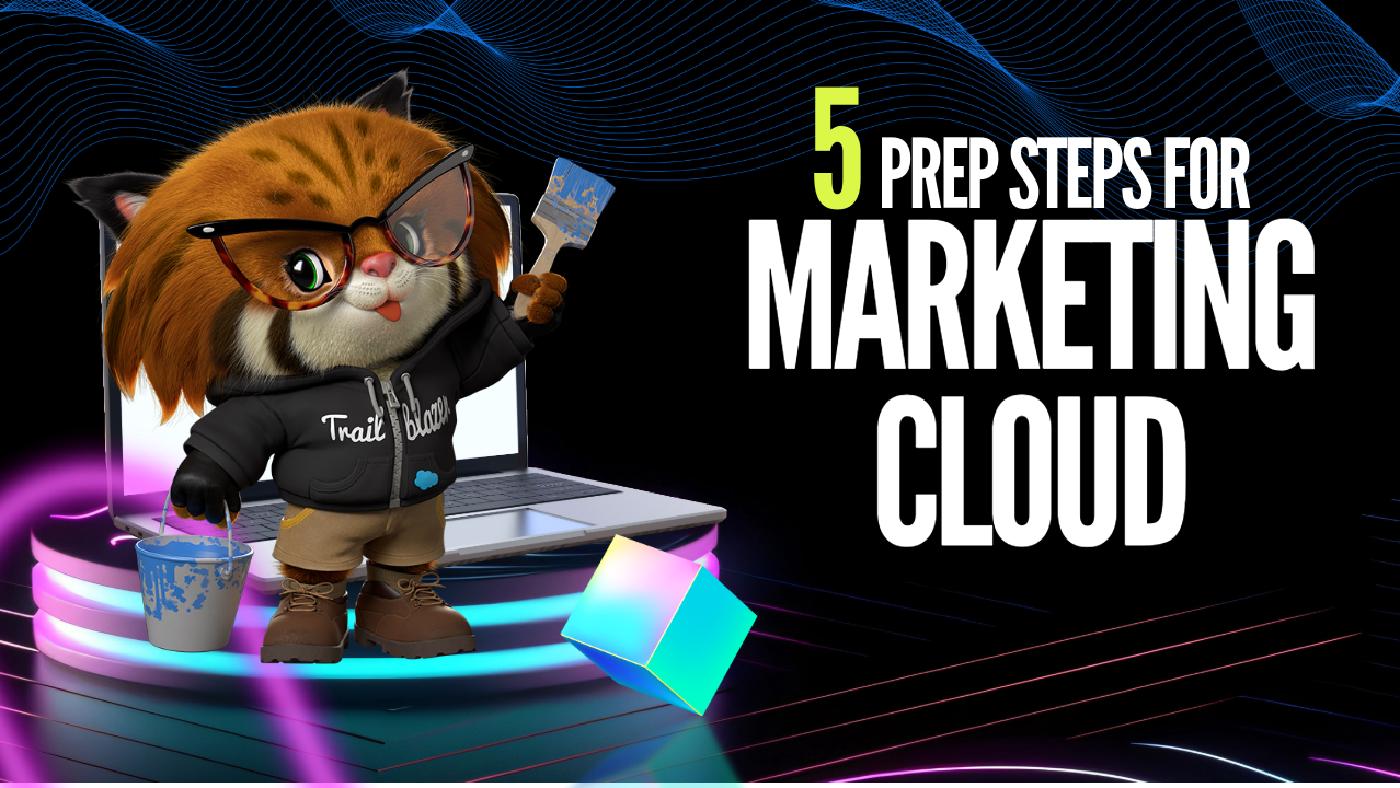Post
5 Prep Steps For Marketing Cloud
Posted on November 12, 2024 (Last modified on January 16, 2026) • 4 min read • 664 wordsDon't implement without them!

Starting a Salesforce Marketing Cloud implementation can be both exciting and complex. With so many tools at your fingertips—email, social media, automation, data management, and more—there’s a lot of potential to reach your customers effectively. But jumping straight into the implementation without the right prep can lead to unnecessary complications and limit the effectiveness of your solution.
In this post, we’ll cover five key steps to prepare for a successful Marketing Cloud implementation and set your organization up for sustained success.
1. Define Clear Goals and KPIs
Before diving into any Marketing Cloud configuration, it’s essential to identify what you aim to achieve. Ask questions like:
- What are your top marketing objectives? (E.g., lead generation, customer engagement, brand awareness)
- Who is your target audience?
- What specific KPIs will measure success?
Setting clear, measurable goals allows you to focus your implementation on the features and functions that directly support these objectives. Defining KPIs early on will also provide a roadmap for evaluating Marketing Cloud’s impact on your organization.
2. Assemble Your Marketing Cloud Team
A successful implementation isn’t a solo endeavor. You’ll need a team that covers multiple roles to ensure all aspects are well-managed. Your Marketing Cloud team should include:
- Project Manager – Keeps everything on track, coordinating resources and deadlines.
- Marketing Strategist – Defines content, campaigns, and target audience needs.
- Salesforce Administrator or Developer – Manages technical configurations, integrations, and customization.
- Data Specialist – Ensures data quality, mapping, and alignment with segmentation needs.
This team will be key to a smooth setup and ongoing operations.
3. Audit Your Data Sources
Marketing Cloud relies on data to segment audiences, personalize messaging, and analyze performance. Before implementation, conduct a data audit to ensure data accuracy and quality. Confirm these key points:
- Data Source Locations – Where is customer data stored (e.g., CRM, data warehouse, other marketing systems)?
- Data Quality and Completeness – Is your data accurate, de-duplicated, and up-to-date?
- Compliance and Permissions – Ensure customer data is collected and managed in compliance with GDPR, CCPA, and other regulations.
Completing a data audit will help you avoid data issues that could impact campaign performance or customer trust.
4. Map Out Your Customer Journeys
Understanding how your customers interact with your brand allows you to leverage Marketing Cloud’s automation tools more effectively. Identify and map out each step in the customer journey, from initial awareness to loyalty and advocacy. Consider:
- Touchpoints – What channels (email, SMS, social, etc.) does your audience prefer at each stage?
- Engagement Triggers – What customer behaviors or data points indicate a new journey stage (e.g., clicking on an email, making a purchase)?
- Automation Opportunities – Look for areas to incorporate automations, such as welcome emails, abandoned cart reminders, and re-engagement campaigns.
A well-defined customer journey map can ensure you’re delivering the right content at the right time.
5. Plan Your Integrations
Salesforce Marketing Cloud is most effective when integrated with your other business systems. Identify key integrations you’ll need, such as with Salesforce Sales Cloud, Service Cloud, or external platforms like Google Analytics or your CRM. Proper planning around integrations includes:
- Identifying Critical Data Flows – Determine what data will need to flow in and out of Marketing Cloud.
- Ensuring Data Consistency – Align data fields across platforms for seamless sharing and reporting.
- Testing – Set aside time in your project plan for testing integrations to avoid data gaps or inconsistencies.
With these integrations in place, you’ll enable a unified view of your customers and drive better decision-making.
Ready to Get Started?
Preparing these foundational steps before starting your Marketing Cloud implementation will save you time, reduce potential errors, and maximize the platform’s value. For more resources on building your Marketing Cloud knowledge and setting your implementation up for success, check out Salesforce’s Marketing Cloud Learning Paths on Trailhead or connect with other Marketing Cloud pros in the Trailblazer Community.
Until next time, keep working hard, smart, and happy! And we’ll see you in the cloud!